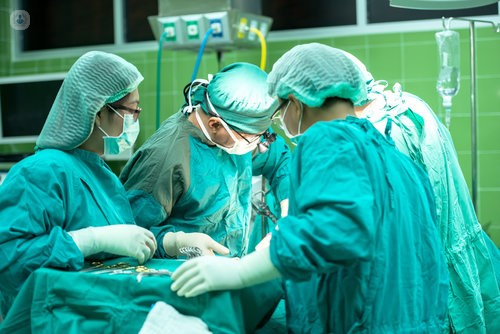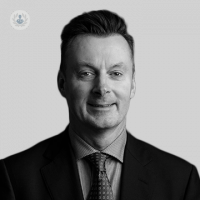Microdiscectomy: a new treatment for slipped disc
Autore:Slipped disc affects approximately 1 in 50 people and can be a serious cause of back pain. Luckily, in the 21st century we have a wide range of ways to treat slipped disc. One of the latest is an innovative procedure called microdiscectomy, which promises an effective surgical solution without causing too much damage to the skin and muscles in your back. We spoke to Mr Nicholas Thomas, a leading neurosurgeon based in London, to find out what it involves.

What exactly is a slipped disc?
A “slipped disc” is a bit of a misnomer. Rather than one of the discs in your spine actually being out of alignment, a slipped disc means that some of the soft tissue which sits between the bones in your spine has pushed out through the spinal canal.
In many ways it’s similar to a hernia, which is why we often refer to the condition as a herniated disc.
When would microdiscectomy be considered?
In the first instance, a slipped disc is managed with non-surgical treatments – including rest, anti-inflammatory medication, and sometimes physical therapy. For many patients this is enough to improve the symptoms and no surgery is necessary.
Surgery is generally only considered if:
- non-surgical treatments have not worked
- the patient continues to experience weakened muscles, numbness, or pain
What does the procedure involve?
Prior to the procedure you’ll have had an MRI scan to see the herniated disc in detail. You’ll also have a discussion with an anaesthetist to check your suitability for anaesthetic, because a microdiscectomy is performed using general anaesthesia.
The procedure takes place in an operating theatre. The steps are as follows:
- the correct disc level is first located with an X-ray
- a small incision is made to the skin and microscope used to visualise the spine
- part of the ligament in the spine is removed
- some bone is nibbled away to free the the nerve root
- the nerve root is moved gently out of the way
- the herniated disc fragment is removed with rongeurs
- finally, the incision is closed.
What is the recovery like?
Usually you’ll need to stay in hospital overnight to be monitored in case any complications occur.
Recovery can take around six weeks. You won’t be able to do any heavy lifting during this time, but you may be given a programme of exercises to carry out to gradually strengthen your back again.
You’re likely to visit the clinic for a follow-up to check on your recovery.
Does the procedure involve any risks?
Complications from a microdiscectomy are rare, but there are still risks, including bleeding, infection, damage to the nerve root, or in rare cases, bladder or bowel incontinence. Prior to the procedure you should have a full discussion with your doctor about the risks involved, and how they compare to other forms of surgery.
If you are suffering from back pain, sciatica or leg pain please do get in touch with Mr Nicholas Thomas at the London Neurosurgery Partnership who will be happy to help and answer any questions you may have.


